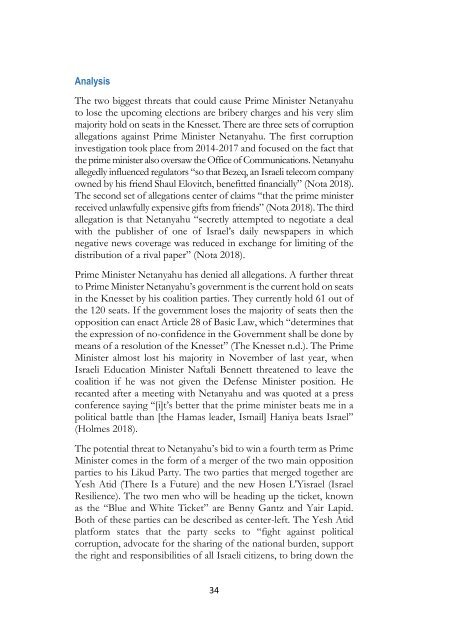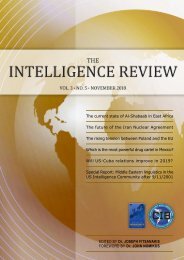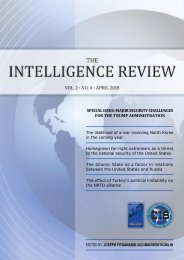The Intelligence Review | volume 3 | issue 6 |
This volume is the product of a collaboration between the European Intelligence Academy (EIA) and the Chanticleer Intelligence Brief (CIB), a pre-professional body supported by the Department of Politics at Coastal Carolina University in Conway, South Carolina, United States. Four CIB analysts tackle some of the most pressing and timely questions confronting intelligence observers today. Topics in this issue include the current and projected state of Sino-Russian relations, as well as recent and projected developments relating to the state of Russia’s Armed Forces. There is also an essay that focuses on the current and projected state of the Sinaloa cartel, one of Mexico’s most prolific organized criminal groups, whose leader, Joaquín Guzmán (also known as el Chapo), is currently serving a life sentence in an American Supermax prison. Last but not least, the present compendium includes an analysis of the leadership prospects of Israel’s embattled Prime Minister, Benjamin Netanyahu.
This volume is the product of a collaboration between the European Intelligence Academy (EIA) and the Chanticleer Intelligence Brief (CIB), a pre-professional body supported by the Department of Politics at Coastal Carolina University in Conway, South Carolina, United States. Four CIB analysts tackle some of the most pressing and timely questions confronting intelligence observers today. Topics in this issue include the current and projected state of Sino-Russian relations, as well as recent and projected developments relating to the state of Russia’s Armed Forces. There is also an essay that focuses on the current and projected state of the Sinaloa cartel, one of Mexico’s most prolific organized criminal groups, whose leader, Joaquín Guzmán (also known as el Chapo), is currently serving a life sentence in an American Supermax prison. Last but not least, the present compendium includes an analysis of the leadership prospects of Israel’s embattled Prime Minister, Benjamin Netanyahu.
You also want an ePaper? Increase the reach of your titles
YUMPU automatically turns print PDFs into web optimized ePapers that Google loves.
Analysis<br />
<strong>The</strong> two biggest threats that could cause Prime Minister Netanyahu<br />
to lose the upcoming elections are bribery charges and his very slim<br />
majority hold on seats in the Knesset. <strong>The</strong>re are three sets of corruption<br />
allegations against Prime Minister Netanyahu. <strong>The</strong> first corruption<br />
investigation took place from 2014-2017 and focused on the fact that<br />
the prime minister also oversaw the Office of Communications. Netanyahu<br />
allegedly influenced regulators “so that Bezeq, an Israeli telecom company<br />
owned by his friend Shaul Elovitch, benefitted financially” (Nota 2018).<br />
<strong>The</strong> second set of allegations center of claims “that the prime minister<br />
received unlawfully expensive gifts from friends” (Nota 2018). <strong>The</strong> third<br />
allegation is that Netanyahu “secretly attempted to negotiate a deal<br />
with the publisher of one of Israel’s daily newspapers in which<br />
negative news coverage was reduced in exchange for limiting of the<br />
distribution of a rival paper” (Nota 2018).<br />
Prime Minister Netanyahu has denied all allegations. A further threat<br />
to Prime Minister Netanyahu’s government is the current hold on seats<br />
in the Knesset by his coalition parties. <strong>The</strong>y currently hold 61 out of<br />
the 120 seats. If the government loses the majority of seats then the<br />
opposition can enact Article 28 of Basic Law, which “determines that<br />
the expression of no-confidence in the Government shall be done by<br />
means of a resolution of the Knesset” (<strong>The</strong> Knesset n.d.). <strong>The</strong> Prime<br />
Minister almost lost his majority in November of last year, when<br />
Israeli Education Minister Naftali Bennett threatened to leave the<br />
coalition if he was not given the Defense Minister position. He<br />
recanted after a meeting with Netanyahu and was quoted at a press<br />
conference saying “[i]t’s better that the prime minister beats me in a<br />
political battle than [the Hamas leader, Ismail] Haniya beats Israel”<br />
(Holmes 2018).<br />
<strong>The</strong> potential threat to Netanyahu’s bid to win a fourth term as Prime<br />
Minister comes in the form of a merger of the two main opposition<br />
parties to his Likud Party. <strong>The</strong> two parties that merged together are<br />
Yesh Atid (<strong>The</strong>re Is a Future) and the new Hosen L'Yisrael (Israel<br />
Resilience). <strong>The</strong> two men who will be heading up the ticket, known<br />
as the “Blue and White Ticket” are Benny Gantz and Yair Lapid.<br />
Both of these parties can be described as center-left. <strong>The</strong> Yesh Atid<br />
platform states that the party seeks to “fight against political<br />
corruption, advocate for the sharing of the national burden, support<br />
the right and responsibilities of all Israeli citizens, to bring down the<br />
34

















